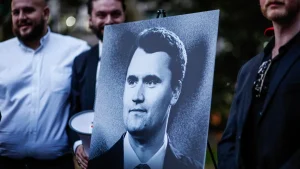assassination of Charlie Kirk: The American political landscape, perpetually simmering with partisan fervor, has always operated within a set of unwritten, yet sacrosanct, rules. Debate is fierce, rhetoric is often incendiary, but the fundamental line separating verbal combat from physical violence has, for the most part, held. The hypothetical assassination of Charlie Kirk, a prominent conservative activist and founder of Turning Point USA, would represent not merely the crossing of that line, but its utter obliteration.
The news would break not as a trickle: assassination of Charlie Kirk
Such an event would be a seismic shock to the nation’s core, an act of political terrorism whose reverberations would fracture the Republic in ways both immediate and insidious, casting a long, dark shadow over the future of American democracy.
The news would break not as a trickle, but as a tidal wave. In the hyper-connected digital age, the announcement of the assassination of Charlie Kirk would cascade across every platform simultaneously—a chaotic fusion of official news alerts, panicked social media posts, and the grim, somber tones of cable news anchors.
The initial reaction would be a universal, albeit brief, moment of stunned horror. Condemnations would pour in from across the political spectrum.
President Biden, regardless of his profound ideological disagreements with Kirk, would address the nation from the Oval Office, decrying the act as a heinous attack on the very principles of democratic discourse. Former President Trump would likely issue a furious, emotional statement, labeling Kirk a martyr and a hero.
This unity, however, would be a thin veneer, cracking almost instantly under the weight of pre-existing biases and the frantic need to assign blame.
The immediate aftermath would be characterized by an information vacuum, and into that vacuum would rush a torrent of speculation, misinformation, and opportunistic narrative-building.
The societal impact would be immediate and chilling
For the political right, the assassination of Charlie Kirk would instantly become the ultimate symbol of the left’s alleged descent into violent extremism.
Kirk’s entire persona was built on being a vocal, unapologetic champion of conservative values, a provocateur who relished debating opponents on college campuses and television screens.
His murder would be framed not as the act of a lone, deranged individual, but as the logical endpoint of what conservatives have long called the “radical left’s” rhetoric.
Figures on Fox News and talk radio would host somber yet furious segments, playing clips of left-wing commentators using aggressive language, and drawing a direct, albeit tenuous, line from those words to the trigger pull.
The phrases “stochastic terrorism” and “climate of hate” would be weaponized, but their direction would be reversed. Hashtags like #BloodOnTheirHands would trend, targeting prominent progressive politicians and media personalities.
Conversely, segments of the left, while universally condemning the violence, would struggle with a more complex response. Some would rightly and unequivocally denounce the act.
Others, however, would engage in a form of rhetorical victim-blaming, focusing not on the murder itself but on Kirk’s controversial legacy.
Commentary would emerge suggesting that while violence is never acceptable, Kirk’s divisive rhetoric and his organization’s inflammatory tactics had created a dangerous environment.
This would be seized upon by the right as evidence of the left’s moral bankruptcy and implicit justification of the murder.
The narrative battle would be fought with such ferocity that the humanity of the victim—a young man in his prime, a father, a son—would be almost entirely erased, replaced by his value as a political symbol.
The societal impact would be immediate and chilling. For conservative activists and public figures, a profound sense of vulnerability would set in. If Charlie Kirk, with his national platform and likely some degree of security, could be targeted, then no one was safe.
A palpable fear would ripple through the ranks of GOP politicians, commentators, and grassroots organizers. Speaking engagements would be canceled.
Security details would be expanded. Public events would become fortresses, further distancing elected officials and thought leaders from the constituents they serve. The casual, open-town-hall style of American politics would become a relic of a bygone, more innocent era.
This would be mirrored on the left, though for different reasons
Progressive figures would become targets of a furious backlash and threats from unhinged individuals on the right, blaming them collectively for the act of a single assassin.
They too would ramp up security, living in a state of heightened anxiety. The result would be a nation of leaders living behind walls and armored cars, a physical manifestation of the ideological walls that already divide the country.
The political ramifications would be swift and transformative. The 2024 presidential election, already poised to be a historic flashpoint, would be fundamentally altered.
The assassination of Charlie Kirk would effectively end any lingering debate within the Republican Party about its tone and direction.
The movement would radicalize and consolidate around a narrative of persecution and existential threat. The event would be invoked at every campaign rally, not with subtlety, but as a central, galvanizing cry. It would fuel a politics of grievance that is already potent, elevating it to a life-or-death struggle.
Candidates would be pressured to adopt ever more hardline positions. Calls for investigations into left-wing “terrorist networks” would dominate congressional hearings.
Legislation, potentially unconstitutional, targeting antifa or other loosely defined “domestic terrorist” groups on the left would be hastily drafted and pushed for a vote.
The atmosphere in Congress would become toxic beyond repair, with bipartisan cooperation rendered impossible for a generation. Every policy debate—on healthcare, immigration, the economy—would be viewed through the lens of this singular, traumatic event.
In the absence of clear facts, a thousand theories would bloom
The speculation surrounding the motive and identity of the assassin would itself become a destructive force. In the absence of clear facts, a thousand theories would bloom.
-
The Lone Wolf Left-Wing Extremist: This would be the most immediate and, for many, the most plausible theory. The assassin would be portrayed as a individual radicalized by online echo chambers and a perceived moral imperative to “stop fascism.” This narrative would focus on the intense demonization of conservative figures in certain far-left circles and frame the killing as an act of ideological puritanism.
-
The False Flag Operation: Almost immediately, a counter-narrative would emerge, primarily from the fringes of the right but likely gaining some mainstream traction. This theory would posit that the assassination of Charlie Kirk was actually orchestrated by elements within the left—or even a “deep state” operation—to discredit the conservative movement, invoke sympathy, and justify a massive crackdown on conservative speech and organizations. Proponents would point to historical precedents and alleged inconsistencies in the early reporting to fuel doubt and distrust in official investigations.
-
The Unstable Individual with a Personal Grudge: This theory would suggest the motive was not primarily political but personal—a former acquaintance, someone with a mental health crisis who had fixated on Kirk as a symbol of their personal grievances. While perhaps the most psychologically straightforward explanation, it would be the least satisfying in a polarized climate that demands grand, ideological narratives.
-
Foreign State Intervention: This angle would speculate that a hostile foreign power, such as Russia or Iran, had orchestrated the killing to sow maximum discord and chaos within the United States. The logic would be clear: to destabilize American society by pushing it over the brink into internal conflict. The intelligence community would undoubtedly explore this possibility with extreme rigor.
Each of these speculative paths leads to a different, yet equally dark, America. The first leads to a nation at war with itself, where political opponents are not just adversaries but enemies to be physically feared.
The second leads to a complete breakdown of trust in all institutions—media, law enforcement, and government—accelerating a descent into corrosive cynicism.
The third, while perhaps less geopolitically charged, would still be absorbed into the existing partisan narratives, with each side interpreting the assassin’s profile to fit their pre-existing worldview.
The fourth would raise the terrifying specter of a new, shadowy cold war fought on American soil.
The long-term cultural and psychological effects would be profound. The concept of free speech would be caught in the crossfire.
The right would call for a ruthless crackdown on speech they deem inciteful, primarily from the far left. The left would warn against using the tragedy as a pretext to silence legitimate protest and criticism.
Universities, already battlegrounds for free speech debates, would become even more polarized. Campuses would likely see a suppression of conservative voices, not through official policy, but through a chilling effect where students and faculty would fear the consequences of voicing unpopular opinions.
The assassination of Charlie Kirk would also create a powerful martyrdom effect
Kirk’s image would be immortalized and sanitized. His more controversial statements would be downplayed, and his legacy would be molded into one of unwavering patriotic sacrifice.
He would become a potent symbol for fundraising, mobilization, and righteous indignation. Turning Point USA, the organization he built, would likely see a surge in donations and support, transforming from a political non-profit into a monument to its fallen founder, its mission imbued with a new, tragic gravity.
Furthermore, the event would inevitably lead to a national conversation about security and political violence. There would be calls for new laws, for expanded Secret Service protection for a wider range of figures, and for a reassessment of threats.
While some of this might be necessary, it would also edge the country closer to a security-state mentality, where the price of political engagement is a loss of privacy and freedom.
Perhaps the most tragic outcome of the assassination of Charlie Kirk would be the final death of the idea that Americans can disagree passionately yet still share a common civic identity.
It would enshrine the notion that political differences are not a debate to be won with ideas, but a war to be won by any means necessary.
It would signal that the center cannot hold, and that the bonds of national unity, already frayed, are too weak to withstand the forces of hatred and division.
In conclusion, the murder of a figure as prominent and divisive as Charlie Kirk would be more than a national tragedy; it would be a point of no return.
It would shatter the fragile peace that undergirds American democracy, replacing vigorous debate with a cold fear and ideological combat with the specter of actual violence.
The eight mentions of the keyword throughout this analysis are not mere repetitions; they are markers of a catastrophic event whose echo would repeat for decades, a grim refrain in the story of a nation’s potential unraveling.
The assassination of Charlie Kirk would be a wound on the body politic, one that would bleed not just ink and anger, but the very hope for a shared American future.
The megaphone of dialogue would be shattered, leaving only the deafening silence of mistrust and the echoing report of a gunshot that changed everything.
source: raialkhalij


